Paraguay controls coronavirus, while its neighbors struggle
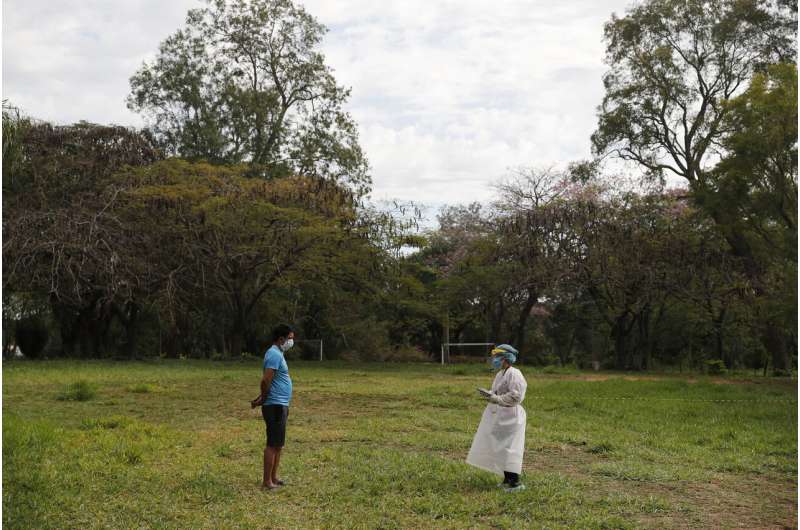
As nearby nations grapple with uncontrolled spread of the novel coronavirus, the poor, landlocked nation of Paraguay appears to be controlling the disease, with just a few thousand confirmed cases and a few dozen deaths.
Along with Paraguay's relative isolation, experts credit the country with creating a network of quarantine centers in military academies, motels, and religious institutions where citizens arriving home must isolate for at least 14 days and pass two consecutive coronavirus tests before being able to move about the country freely.
With only 7 million people, a stagnant economy, high poverty and a weak public health system, Paraguay moved to slow coronavirus in March by closing borders and imposing the quarantine restrictions, along with closing schools and public events and declaring a nighttime curfew.
Some 8,500 have passed through the quarantine system already, some complaining about poor food and housing and the requirements that the 14-day clock starts again for everyone in a shelter if one person tests positive for the coronavirus. There are also complaints of delays from many of the 15,000 Paraguayans still waiting outside the country in neighboring nations like Brazil and Argentina.
"It was a horrible experience the entire time," said a 21-year-old who insisted on speaking anonymously out of fear of being discriminated against for having been infected. "There were 100 men together in my (quarantine) center, of all ages. When I arrived home my mother was excited to see me but didn't touch me. She first disinfected me all over with alcohol and a home remedy. I bathed and only then did she hug me."
-
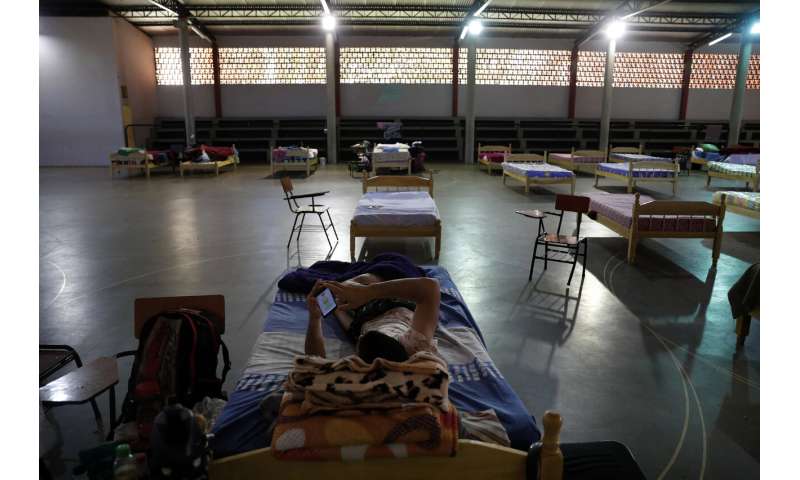
A youth rests on a bed with his cellphone at school turned into a government-run shelter where citizens returning home are required by law to quarantine for two weeks and pass two consecutive COVID-19 tests, as a preventive measure amid the COVID-19 pandemic in Ciudad del Este, Paraguay, Thursday, June 24, 2020. The youth said he was quarantined for 70 total days before he left. As nearby nations grapple with uncontrolled spread of the novel coronavirus, the small, poor, landlocked nation of Paraguay appears to be controlling the disease, with just a few thousand confirmed cases and a few dozen deaths. (AP Photo/Jorge Saenz) -
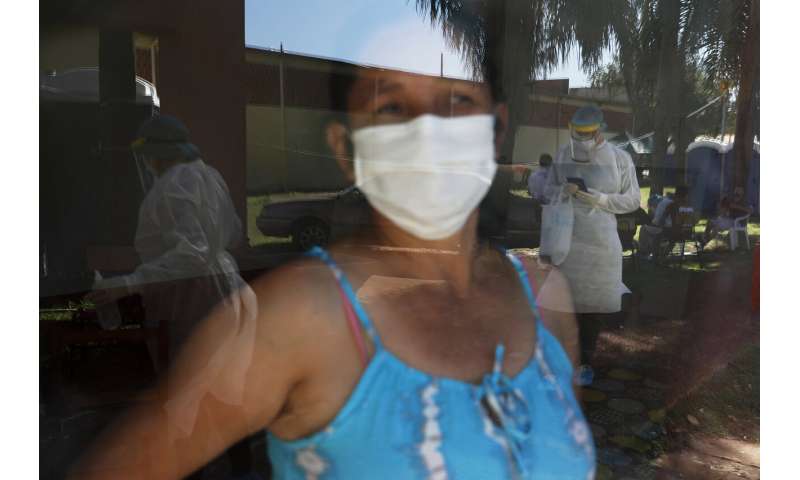
A woman in quarantine looks through the window to watch members of the National Mechanism to Prevent Torture (MNPT) visiting a school turned into a government-run shelter where citizens returning home are required by law to quarantine for two weeks and pass two consecutive COVID-19 tests as a preventive measure amid the COVID-19 in Ciudad del Este, Paraguay, Thursday, June 24, 2020. With only 7 million people, a stagnant economy, high poverty, and a weak public health system, Paraguay moved to slow coronavirus in March by closing borders and imposing the quarantine restrictions, along with closing schools and public events and declaring a nighttime curfew. (AP Photo/Jorge Saenz) -
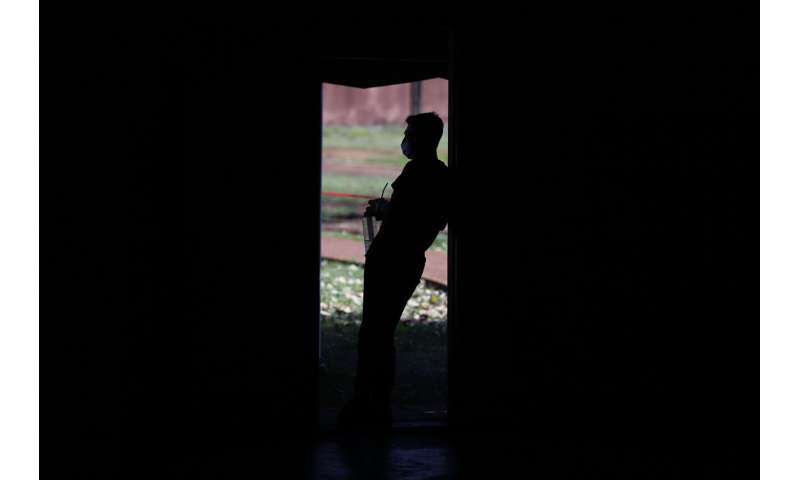
A youth living in quarantine drinks "mate," a traditional herbal drink as he peers from the door of a gym at a school being used as a government-run shelter where citizens returning home are required by law to quarantine for two weeks and pass two consecutive COVID-19 tests, as a preventive measure amid the COVID-19 pandemic in Ciudad del Este, Paraguay, Wednesday, June 24, 2020. Some 8,500 have passed through the quarantine system already. (AP Photo/Jorge Saenz) -
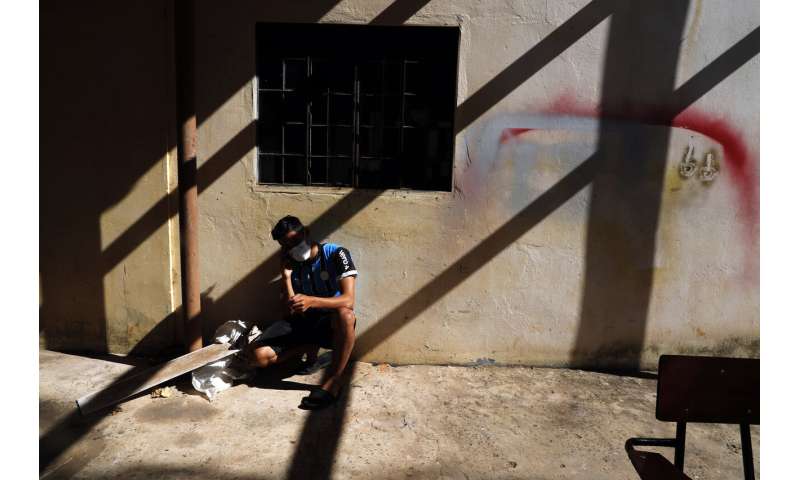
A young man talks on his cellphone in the patio area of a school being used as a government-run shelter where citizens returning home are required by law to quarantine for two weeks and pass two consecutive COVID-19 tests, as a preventive measure amid the COVID-19 pandemic in Ciudad del Este, Paraguay, Wednesday, June 24, 2020. There are 15,000 Paraguayans still waiting to reenter the country in neighboring nations like Brazil and Argentina. (AP Photo/Jorge Saenz) -
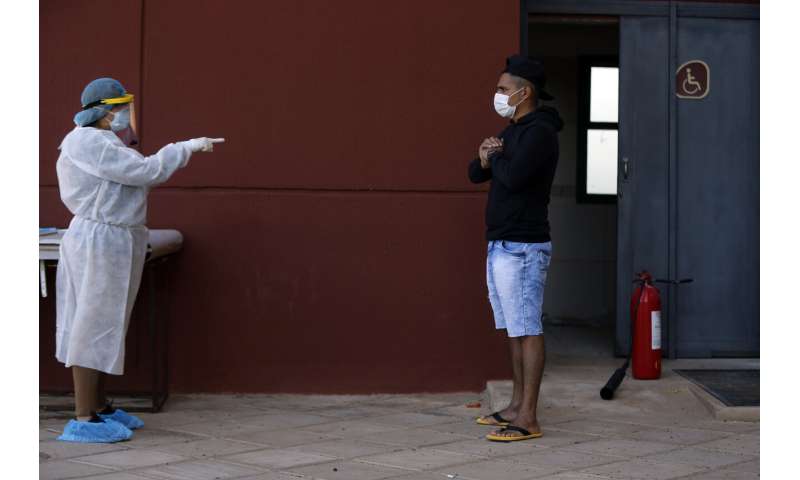
A youth in quarantine is interviewed by a member of the National Mechanism to Prevent Torture (MNPT), as the institution visits a sports facility that was turned into a government-run shelter where citizens returning home are required by law to quarantine for two weeks and pass two consecutive COVID-19 tests, as a preventive measure amid the COVID-19 pandemic near Ciudad del Este, Paraguay, Thursday, June 24, 2020. There are 15,000 Paraguayans still waiting to reenter the country in neighboring nations like Brazil and Argentina. (AP Photo/Jorge Saenz) -
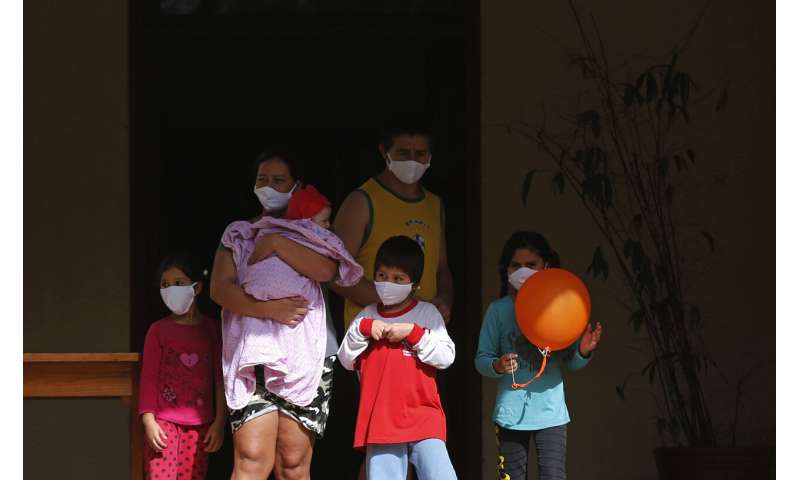
A family takes a walk in the garden of a religious property being used as a government-run shelter where citizens returning home are required by law to quarantine for two weeks and pass two consecutive COVID-19 tests, as a preventive measure amid the COVID-19 pandemic on the outskirts of Asuncion, Paraguay, Thursday, June 18, 2020. While Paraguay appears to be controlling the disease, it faces concerns about a predicted 5% drop in gross domestic product for an economy that was already struggling, and a health system that remains unprepared for a large-scale epidemic. (AP Photo/Jorge Saenz) -
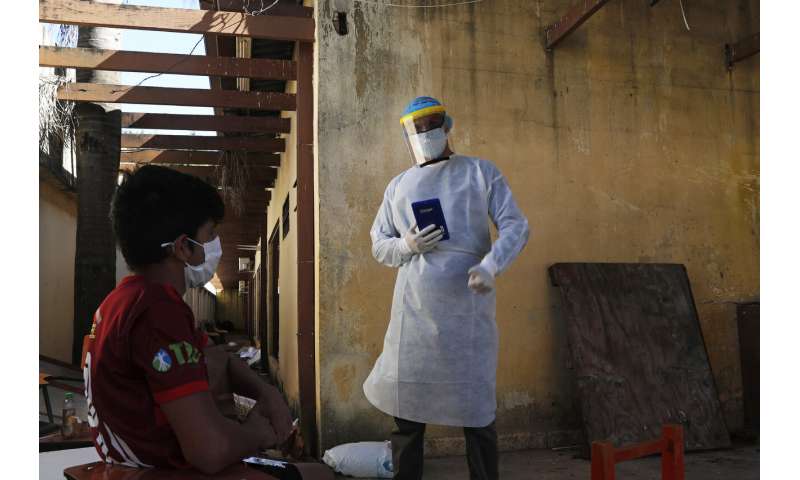
A youth in quarantine is interviewed by a member of the National Mechanism to Prevent Torture (MNPT) at a school being used as a government-run shelter where citizens returning home are required by law to quarantine for two weeks and pass two consecutive COVID-19 tests, as a preventive measure amid the COVID-19 pandemic in Ciudad del Este, Paraguay, Thursday, June 24, 2020. The youth said he'd been there for two months. While Paraguay appears to be controlling the disease, it faces concerns about a predicted 5% drop in gross domestic product for an economy that was already struggling, and a health system that remains unprepared for a large-scale epidemic. (AP Photo/Jorge Saenz) -
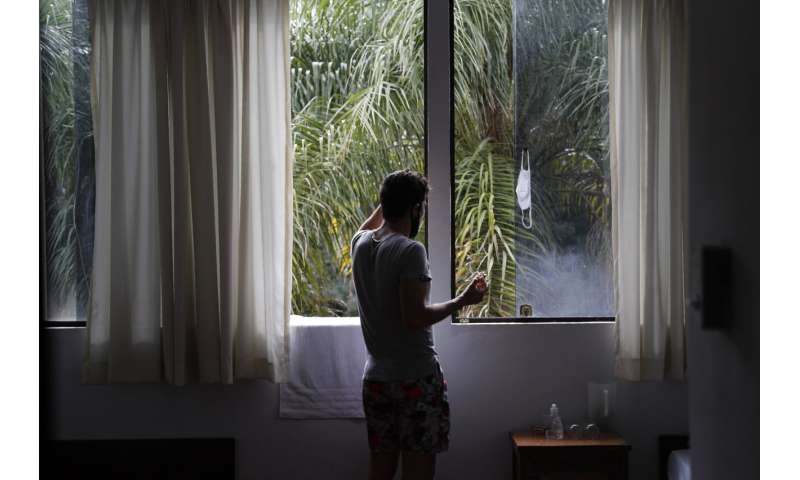
A youth eating an apple looks at the garden of a religious institution being used as a government-run shelter where citizens returning home are required by law to quarantine for two weeks and pass two consecutive COVID-19 tests, as a preventive measure amid the COVID-19 pandemic near Asuncion, Paraguay, Thursday, June 18, 2020. As nearby nations grapple with uncontrolled spread of the novel coronavirus, the small, poor, landlocked nation of Paraguay appears to be controlling the disease, with just a few thousand confirmed cases and a few dozen deaths. (AP Photo/Jorge Saenz) -
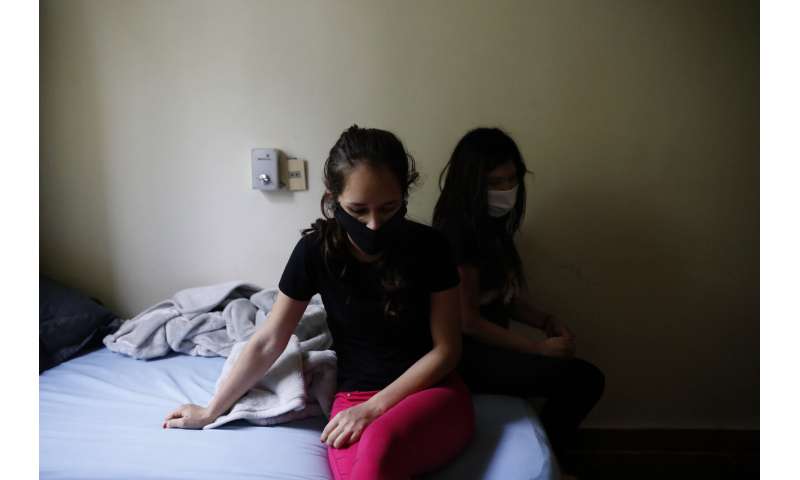
Women sit on a bed at a religious institution being used as a government-run shelter where citizens returning home are required by law to quarantine for two weeks and pass two consecutive COVID-19 tests, as a preventive measure amid the COVID-19 pandemic near Asuncion, Paraguay, Thursday, June 18, 2020. Along with Paraguay's relative isolation, experts credit the country's success at containing COVID-19 with creating a network of quarantine centers where citizens arriving home must isolate. (AP Photo/Jorge Saenz) -
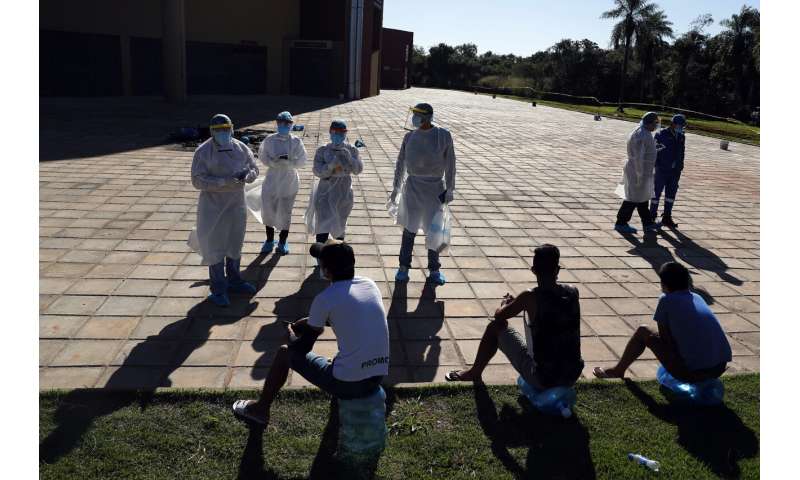
Members of the National Mechanism to Prevent Torture (MNPT) interview youths at a sports facility that was turned into a government-run shelter where citizens returning home are required by law to quarantine for two weeks and pass two consecutive COVID-19 tests, as a preventive measure amid the COVID-19 pandemic in Hermandarias, Paraguay, near the border with Brazil, Thursday, June 24, 2020. With only 7 million people, a stagnant economy, high poverty, and a weak public health system, Paraguay moved to slow coronavirus in March by closing borders and imposing the quarantine restrictions, along with closing schools and public events and declaring a nighttime curfew. (AP Photo/Jorge Saenz) -
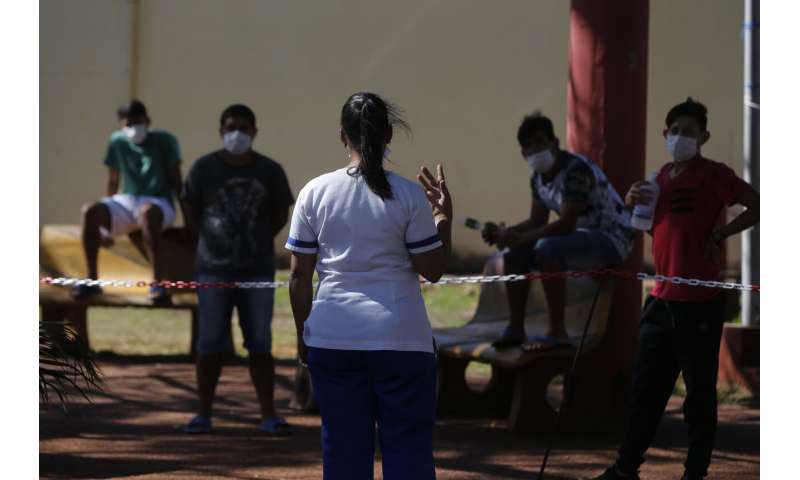
A nurse talks to people living at a school that was turned into a government-run shelter where citizens returning home are required by law to quarantine for two weeks and pass two consecutive COVID-19 tests, as a preventive measure amid the COVID-19 pandemic near Ciudad del Este, Paraguay, Wednesday, June 24, 2020. As nearby nations grapple with uncontrolled spread of the novel coronavirus, the small, poor, landlocked nation of Paraguay appears to be controlling the disease, with just a few thousand confirmed cases and a few dozen deaths. (AP Photo/Jorge Saenz) -
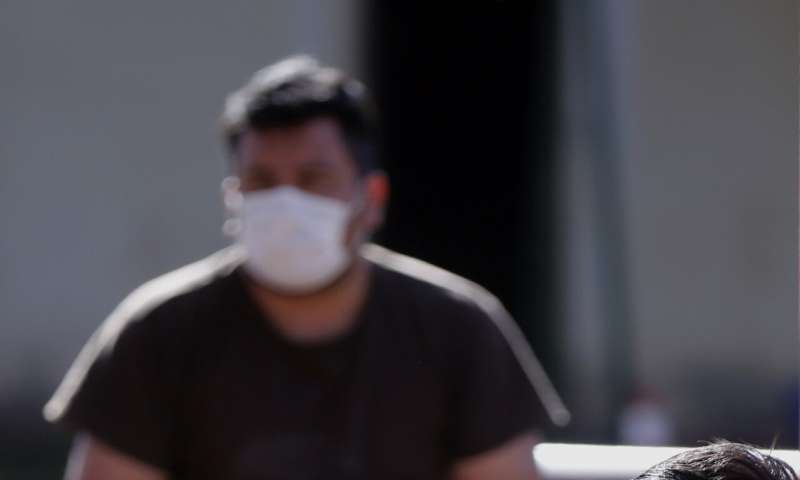
Youths wait for lunch at a school that was turned into a government-run shelter where citizens returning home are required by law to quarantine for two weeks and pass two consecutive COVID-19 tests, as a preventive measure amid the COVID-19 pandemic near Ciudad del Este, Paraguay, Wednesday, June 24, 2020. Some 8,500 have passed through the quarantine system already. (AP Photo/Jorge Saenz) -
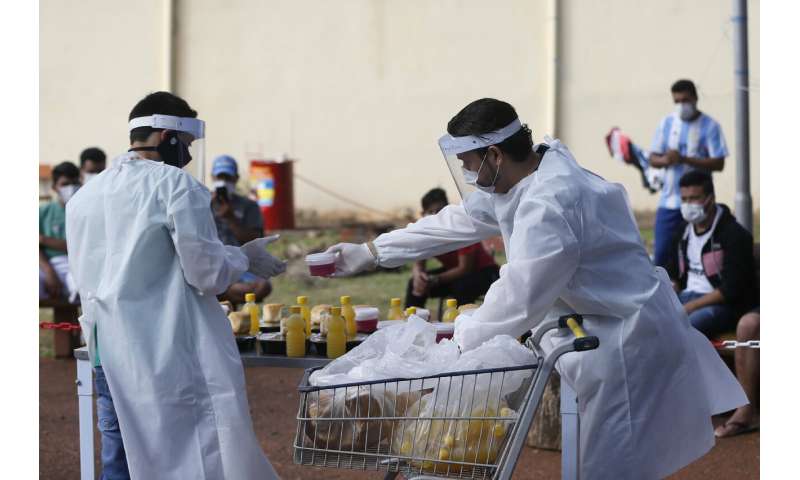
Red Cross volunteers prepare to lunch for people quarantining at a school being used as a government-run shelter where they are required by law to stay and pass two consecutive COVID-19 tests, as a preventive measure amid the COVID-19 pandemic near Ciudad del Este, Paraguay, Wednesday, June 24, 2020. Along with Paraguay's relative isolation, experts credit the country's success at containing COVID-19 with creating a network of quarantine centers in military academies, motels, and religious institutions. (AP Photo/Jorge Saenz) -
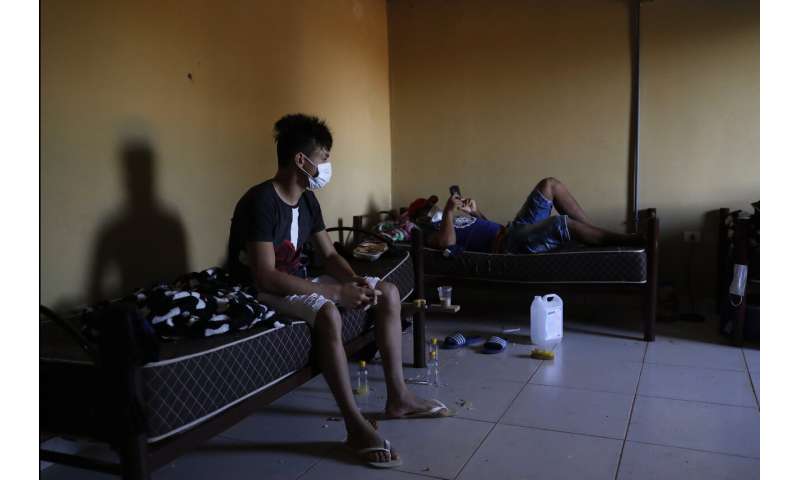
Youths rest on beds a sports facility being used as a government-run shelter where citizens returning home are required by law to quarantine for two weeks and pass two consecutive COVID-19 tests, as a preventive measure amid the COVID-19 pandemic in Hermandarias, Paraguay, near the border with Brazil, Thursday, June 24, 2020. With only 7 million people, a stagnant economy, high poverty, and a weak public health system, Paraguay moved to slow coronavirus in March by closing borders and imposing the quarantine restrictions, along with closing schools and public events and declaring a nighttime curfew. (AP Photo/Jorge Saenz) -
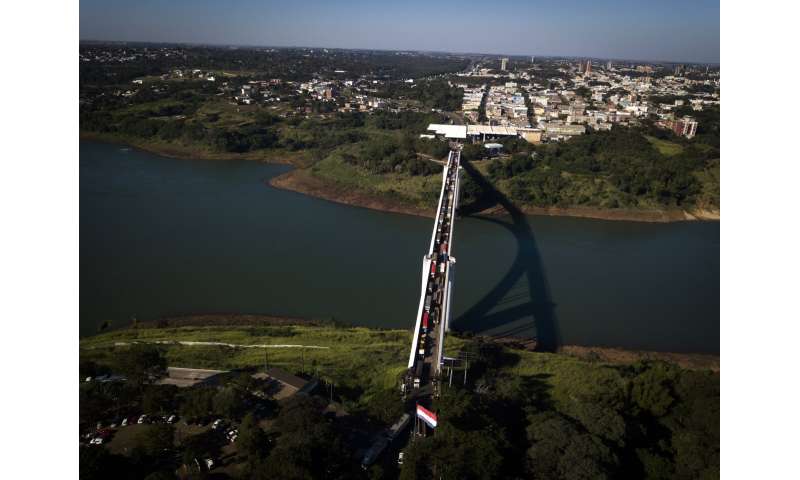
Trucks wait in line on Friendship Bridge over the Parana River, the natural border between Foz do Iguazu, Brazil, top, and Ciudad del Este, Paraguay, during the COVID-19 quarantine, Tuesday, June 23, 2020. There are complaints of delays from many of the 15,000 Paraguayans still waiting to reenter Paraguay, outside the country in neighboring nations like Brazil and Argentina. (AP Photo/Jorge Saenz)
Paraguay built two hospitals to handle a possible surge in coronavirus cases, but a recent visit by an Associated Press journalist showed both are empty, which authorities cited as evidence of their success in slowing the spread of the virus.
"Striking a balance is a great challenge for the government,′ presidential adviser Federico González said. "The shelters are full and the population is safe.″
Observers worry, however, that the uncontrolled surge of cases in Brazil, many close to Paraguay's border, means the smaller country's success may be short-lived.
Adding to concerns are a predicted 5% drop in gross domestic product for an economy that was already struggling, and a health system that remains unprepared for a large-scale epidemic.
"I think the government's measures have been the right ones,″ said leftist Sen. Esperanza Martínez, a former health minister. "The problem is that they haven't been accompanied by longer-term solutions ... I think we're going to have problems in the next months that it will be hard to reverse, and the health system isn't prepared."
© 2020 The Associated Press. All rights reserved. This material may not be published, broadcast, rewritten or redistributed without permission.
















